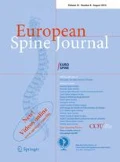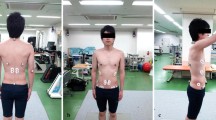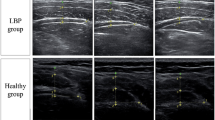Abstract
The role of the abdominal muscles in trunk rotation is not comprehensively understood. This study investigated the electromyographic (EMG) activity of anatomically distinct regions of the abdominal muscles during trunk rotation in six subjects with no history of spinal pain. Fine-wire electrodes were inserted into the right abdominal wall; upper region of transversus abdominis (TrA), middle region of TrA, obliquus internus abdominis (OI) and obliquus externus abdominis (OE), and lower region of TrA and OI. Surface electrodes were placed over right rectus abdominis (RA). Subjects performed trunk rotation to the left and right in sitting by rotating their pelvis relative to a fixed thorax. EMG activity was recorded in relaxed supine and sitting, and during an isometric hold at end range. TrA was consistently active during trunk rotation, with the recruitment patterns of the upper fascicles opposite to that of the middle and lower fascicles. During left rotation, there was greater activity of the lower and middle regions of contralateral TrA and the lower region of contralateral OI. The upper region of ipsilateral TrA and OE were predominately active during right rotation. In contrast, there was no difference in activity of RA and middle OI between directions (although middle OI was different between directions for all but one subject). This study indicates that TrA is active during trunk rotation, but this activity varies between muscle regions. These normative data will assist in understanding the role of TrA in lumbopelvic control and movement, and the effect of spinal pain on abdominal muscle recruitment.




Similar content being viewed by others
References
Andersson EA, Grundstrom H, Thorstensson A (2002) Diverging intramuscular activity patterns in back and abdominal muscles during trunk rotation. Spine 27(6):E152–160
Askar OM (1977) Surgical anatomy of the aponeurotic expansions of the anterior abdominal wall. Ann R Coll Surg Engl 59(4):313–321
Baecke JAH, Burema J, Frijters JER (1982) A short questionnaire for the measurement of habitual physical activity in epidemiological studies. Am J Clin Nutr 36(5):936–942
Barker PJ, Briggs CA, Bogeski G (2004) Tensile transmission across the lumbar fasciae in unembalmed cadavers: effects of tension to various muscular attachments. Spine 29(2):129-138.
Barrett J, Cerny F, Hirsch JA, Bishop B (1994) Control of breathing patterns and abdominal muscles during graded loads and tilt. J Appl Physiol 76(6):2473–2480
Carman DJ, Blanton PL, Biggs NL (1972) Electromyographic study of the anterolateral abdominal musculature utilising indwelling electrodes. Am J Phys Med 51(3):113–129
Cresswell AG, Grundstrom H, Thorstensson A (1992) Observations on intra-abdominal pressure and patterns of abdominal intra-muscular activity in man. Acta Physiol Scand 144(4):409–418
Davis JR, Mirka GA (2000) Transverse-contour modeling of trunk muscle-distributed forces and spinal loads during lifting and twisting. Spine 25(2):180–189
De Troyer A (1983) Mechanical role of the abdominal muscles in relation to posture. Respir Physiol 53(3):341–353
De Troyer A, Estenne M, Ninane V, Van Gansbeke D, Gorini M (1990) Transversus abdominis muscle function in humans. J Appl Physiol 68(3):1010–1016
Eisler P (1912) Die muskeln des stammes. Verlag von Gustav Fischer, Jena, Germany
Floyd WF, Silver PHS (1950) Electromyographic study of patterns of the anterior abdominal wall muscles in man. J Anat 84:132–145
Gandevia SC, Wilson LR, Inglis JT, Burke D (1997) Mental rehearsal of motor tasks recruits alpha-motoneurons but fails to recruit human fusiform neurones selectively. J Physiol (Lond) 505:259–266
Gardner-Morse MG, Stokes IAF (1998) The effects of abdominal muscle coactivation on lumbar spine stability. Spine 23(1):86–92
Goldman JM, Lehr RP, Millar AB, Silver JR (1987) An electromyographic study of the abdominal muscles during postural and respiratory manoeuvres. J Neurol Neurosurg Psychiatry 50(7):866–869
Hodges PW, Richardson CA (1997) Feedforward contraction of transversus abdominis is not influenced by the direction of arm movement. Exp Brain Res 114(2):362–370
Hodges PW, Gandevia SC, Richardson CA (1997) Contractions of specific abdominal muscles in postural tasks are affected by respiratory maneuvers. J Appl Physiol 83(3):753–760
Hodges PW, Cresswell A, Thorstensson A (1999) Preparatory trunk motion accompanies rapid upper limb movement. Exp Brain Res 124(1):69–79
Hodges PW, Cresswell AG, Daggfeldt K, Thorstensson A (2000) Three dimensional preparatory trunk motion precedes asymmetrical upper limb movement. Gait Posture 11(2):92–101
Hodges PW, Cresswell AG, Daggfeldt K, Thorstensson A (2001) In vivo measurement of the effect of intra-abdominal pressure on the human spine. J Biomech 34(3):347–353
Hodges PW, Pengel LH, Herbert RD, Gandevia SC (2003) Measurement of muscle contraction with ultrasound imaging. Muscle Nerve 27(6):682-692
Hoek van Dijke GA, Snijders CJ, Stoeckart R, Stam HJ (1999) A biomechanical model on muscle forces in the transfer of spinal load to the pelvis and legs. J Biomech 32(9):927–933
Hoogendoorn WE, Bongers PM, de Vet HC, Ariens GA, van Mechelen W, Bouter LM (2002) High physical work load and low job satisfaction increase the risk of sickness absence due to low back pain: results of a prospective cohort study. Occup Environ Med 59(5):323–328
Juker D, McGill S, Kropf P, Steffen T (1998) Quantitative intramuscular myoelectric activity of lumbar portions of psoas and the abdominal wall during a wide variety of tasks. Med Sci Sports Exerc 30(2):301–310
Kumar S, Narayan Y, Garand D (2001) Isometric axial rotation of the trunk in the neutral posture. Eur J Appl Physiol 86(1):53–61
Marras WS, Granata KP (1995) A biomechanical assessment and model of axial twisting in the thoracolumbar spine. Spine 20(13):1440–1451
McGill SM (1991) Electromyographic activity of the abdominal and low back musculature during the generation of isometric and dynamic axial trunk torque: implications for lumbar mechanics. J Orthop Res 9(1):91–103
Mirka G, Kelaher D, Baker A, Harrison A, Davis J (1997) Selective activation of the external oblique musculature during axial torque production. Clin Biomech (Bristol, Avon) 12(3):172–180
Misuri G, Colagrande S, Gorini M, Iandelli I, Mancini M, Duranti R, Scano G (1997) In vivo ultrasound assessment of respiratory function of abdominal muscles in normal subjects. Eur Respir J 10(12):2861–2867
Ng JK-F, Kippers V, Richardson CA (1998) Muscle fibre orientation of abdominal muscles and suggested surface EMG electrode positions. Electromyogr Clin Neurophysiol 38(1):51–58
Ng JK-F, Richardson CA, Parnianpour M, Kippers V (2002) EMG activity of trunk muscles and torque output during isometric axial rotation exertion: a comparison between back pain patients and matched controls. J Orthop Res 20(1):112–121
Partridge MJ, Walters CE (1960) Participation of the abdominal muscles in various movements of the trunk in man. An electromyographic study. Phys Ther Rev 39(12):791–800
Poirier P, Charpy A (1901) Traité d’anatomie humaine. Masson, Paris
Pope MH, Andersson GBJ, Broman H, Svensson M, Zetterberg C (1986) Electromyographic studies of the lumbar trunk musculature during the development of axial torques. J Orthop Res 4(3):288–297
Pope MH, Svensson M, Andersson GBJ, Broman H, Zetterberg C (1987) The role of prerotation of the trunk in axial twisting efforts. Spine 12(10):1041–1045
Rab GT, Chao EYS, Stauffer RN (1977) Muscle force analysis of the lumbar spine. Orthop Clin North Am 8(1):193–199
Rasch PJ, Burke RK (1977) Kinesiology and applied anatomy. Lea and Febiger, Philadelphia
Richardson CA, Snijders CJ, Hides JA, Damen L, Pas MS, Storm J (2002) The relation between the transversus abdominis muscles, sacroiliac joint mechanics, and low back pain. Spine 27(4):399–405
Snijders CJ, Bakker MP, Vleeming A, Stoeckart R, Stam HJ (1995) Oblique abdominal muscle activity in standing and sitting on hard and soft seats. Clin Biomech (Bristol, Avon) 10(2):73–78
Snijders CJ, Vleeming A, Stoeckart R, Mens JMA, Kleinrensink GJ (1995) Biomechanical modeling of sacroiliac joint stability in different postures. In: Dorman TA (ed) Spine: State of the art reviews. Hanley and Belfus, Philadelphia, pp 419–432
Soderberg GL, Dostal WF (1978) Electromyographic study of three parts of the gluteus medius during functional activities. Phys Ther 58:691–696
Strohl KP, Mead J, Banzett RB, Loring SH, Kosch PC (1981) Regional differences in abdominal muscle activity during various maneuvers in humans. J Appl Physiol 51(6):1471–1476
Urquhart DM, Barker PJ, Hodges PW, Story I, Briggs CA (2004) Regional morphology of the transversus abdominis and obliquus internus and obliquus externus abdominis muscles. Clin Biomech (accepted)
Vleeming A, Pool-Goudzwaard AL, Stoeckart R, van Wingerden JP, Snijders CJ (1995) The posterior layer of the thoracolumbar fascia. Its function in load transfer from spine to legs. Spine 20(7):753-758
Zimmerman LM, Anson BJ, Morgan EH, McVay CB (1944) Ventral hernia due to normal banding of the abdominal muscles. Surg Gynecol Obstet 78:535–540
Author information
Authors and Affiliations
Corresponding author
Rights and permissions
About this article
Cite this article
Urquhart, D.M., Hodges, P.W. Differential activity of regions of transversus abdominis during trunk rotation. Eur Spine J 14, 393–400 (2005). https://doi.org/10.1007/s00586-004-0799-9
Received:
Revised:
Accepted:
Published:
Issue Date:
DOI: https://doi.org/10.1007/s00586-004-0799-9




